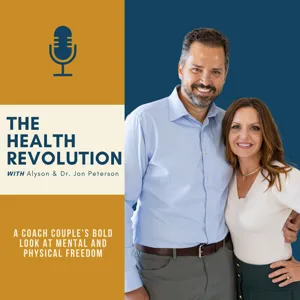Podcast Summary
Understanding the Complexity of Dislike and Hate: Dislike is a subtle and controllable emotion, while hate is intense and uncontrollable. Dislike can be hidden and masked, while hate is harder to conceal. Understanding the difference can improve interpersonal relationships and interactions. A professional and effective website is crucial for product and brand success.
Dislike and hate are two distinct emotions, with dislike being a more subtle and controllable feeling compared to the intense and uncontrollable nature of hate. The speaker finds dislike to be a more complex emotion, as it can stem from various reasons and may not always be easily identifiable. Dislike can be hidden and masked with politeness, while hate is more consuming and harder to conceal. Understanding the difference between these emotions can help us navigate our interpersonal relationships and interactions with others. Additionally, the importance of having a professional and effective website was emphasized, as it can significantly impact the success of selling a product or brand.
Reasons for Disliking Someone: People can dislike others due to inauthenticity, humor differences, big egos, bad attitudes, competitiveness, or natural disagreements. It's normal to dislike some people, but we should treat them with respect.
Disliking someone can stem from various reasons, some obvious like harm or disagreement, while others are more subtle such as perceived inauthenticity or a sense of humor that doesn't align. People may not always be aware of why they don't like someone and it can be a complex emotion. Some common reasons include feelings of unease due to inauthenticity, frustration with someone's sense of humor, cockiness or big egos, bad attitudes, and competitiveness. It's important to note that not everyone will share the same sense of humor or values, leading to natural disagreements. However, it's also common to dislike a significant percentage of the people we meet, which can leave us questioning whether we're in the wrong for feeling this way. It's essential to remember that disliking someone doesn't mean we should treat them poorly or act upon negative feelings. Instead, we can empathize and wish them well while acknowledging that not everyone will be a good fit for us. Ultimately, it's a normal part of human experience to dislike some people, and it doesn't make us a bad person.
It's okay to dislike someone: While it's inspiring to love everyone, it's also okay to dislike someone without being a bad person. Understand that everyone has complex emotions and experiences, and work through feelings with respect and dignity for all.
While the idea of loving everyone can be inspiring, it may not be realistic or helpful in all situations. Disliking someone, even if it's just in your own thoughts, doesn't necessarily make you a bad person. It's important to understand that everyone has complex emotions and experiences, and it's okay to acknowledge and work through those feelings. The reasons for disliking someone can stem from various sources, such as past social experiences or trust issues. However, it's essential to remember that everyone deserves respect and dignity, even if you don't feel positively towards them. Ultimately, it's important to strive for understanding and compassion towards others, but also to recognize the limits of our emotions and the complexity of human relationships.
Our past experiences shape our interactions: Being aware of past hurts and approaching new relationships with patience and understanding can help overcome sensitivity and cautiousness.
Our past experiences, both good and bad, shape the way we approach new relationships and interactions. When we've been hurt or betrayed, we become more sensitive and cautious, which can make it harder to connect with new people. Our "muscle memory" can cause us to react negatively to situations or individuals that remind us of past hurts, even if we're not fully aware of it. Additionally, for those who have a broader perspective on life and are more intellectually stimulated, finding people who can engage in deeper conversations can be a challenge as most initial interactions tend to be small talk or material conversations. However, it's important to remember that everyone has their own comfort level and pace when it comes to connecting with others, and having patience and understanding can help bridge the gap.
Managing Expectations for Better Outcomes: Understanding and managing expectations can lead to better shopping experiences, successful online businesses, and stronger relationships. Walmart offers trendy styles and easy shopping, while Squarespace simplifies website creation for entrepreneurs. Avoiding unrealistic expectations for others and addressing personal insecurities can improve relationships.
Expectations play a significant role in our experiences and relationships. Whether it's expecting a seamless online shopping experience or having realistic expectations for others, understanding and managing our expectations can lead to better outcomes. Regarding shopping, Walmart offers the convenience of upgrading your look or furniture in-store or online through their app. Walmart's noughtrending section showcases the latest spring styles, ensuring you stay on trend. When it comes to selling products or building a brand, having a well-designed website is crucial. Squarespace is an all-in-one platform that simplifies the process for entrepreneurs, offering professionally curated layouts and AI assistance. Squarespace also makes checkout easy for customers with simple payment methods. On a personal note, having unrealistic expectations for others can lead to disappointment. We often set these expectations subconsciously, and it's essential to be aware of this and strive for a more balanced perspective. Additionally, disliking others may sometimes be a reflection of our own self-perception. Understanding and addressing our own insecurities and feelings of self-worth can help us build stronger relationships and reduce unnecessary dislike for others.
Understanding reasons for disliking others: Recognizing feelings of discomfort, irritation, or exhaustion can help explain why we dislike certain people, promoting self-awareness and empathy
Feeling uncomfortable around others or being required to hide your true self can lead to resentment and dislike towards people, regardless of their intentions. Additionally, some people may be easily irritated or believe all people are bad, which can also contribute to disliking others. Introverts, who recharge by being alone and feel drained by excessive social interactions, may also dislike people due to the mental and emotional exhaustion caused by socialization. However, it's important to note that disliking people is not necessarily a morally wrong act, but understanding the reasons behind our feelings towards others can help us navigate interpersonal relationships more effectively. Ultimately, being aware of these factors can lead to greater self-understanding and empathy towards others.
Three reasons to dislike or hate people: Disliking people can demonstrate moral awareness, make life interesting, and protect us from unhealthy relationships
Disliking people and even hating them can have its merits. According to an opinion piece in the Harvard Crimson, there are three reasons to dislike or hate: to demonstrate moral awareness, make life more interesting, and because sometimes people deserve it. Disliking people can help us understand what we don't align with and make life more interesting by providing contrast to those we love and respect. It can also serve as a protection mechanism to avoid spending time with people who may not deserve it. The article suggests that not being observant and not feeling dislike for people could potentially lead to getting burned in relationships. Overall, the article argues that disliking people is a natural and necessary part of life.
Understanding Healthy Dislike vs Unhealthy Hatred: Recognize healthy dislike as normal part of relationships, but be aware of unhealthy hatred and underlying issues. Respect and love others based on actions, not just given. Prioritize self-awareness and social life for mental well-being.
It's natural and even necessary to have complex emotions towards others, including dislike. However, it's important to recognize the difference between healthy dislike and unhealthy hatred. The former can be a normal part of human relationships, while the latter may indicate underlying issues that require attention. Additionally, respecting and loving others should be earned, making those feelings more meaningful. The episode also highlighted the importance of self-awareness and finding a social life that suits your needs, whether that's through therapy or other means. Lastly, the idea that it's healthy to hide negative feelings and keep a "polite" facade in public is a controversial one, but some people may find it relieving to acknowledge that it's okay not to like everyone all the time. Ultimately, it's important to find a balance and prioritize mental well-being.
Acceptance of disliking people: It's natural to dislike people, but treating them with kindness and respect is crucial. Recognize when dislike stems from deeper issues and handle situations with empathy and second chances.
It's natural and okay to dislike people as long as it doesn't cause harm to oneself or others. It's important to treat others with kindness and respect, even when we don't like them. Disliking people doesn't make us a bad person, and everyone has the right to their feelings. However, it's crucial to recognize when our dislike stems from deeper issues and address them accordingly. It's essential to handle situations with empathy and give people a second chance when appropriate. Ultimately, it's important to validate our feelings and not feel guilty for disliking someone. Hatred is a different story and should be addressed separately. The speaker is excited about this newfound acceptance and looks forward to living her life without the guilt of disliking people.





